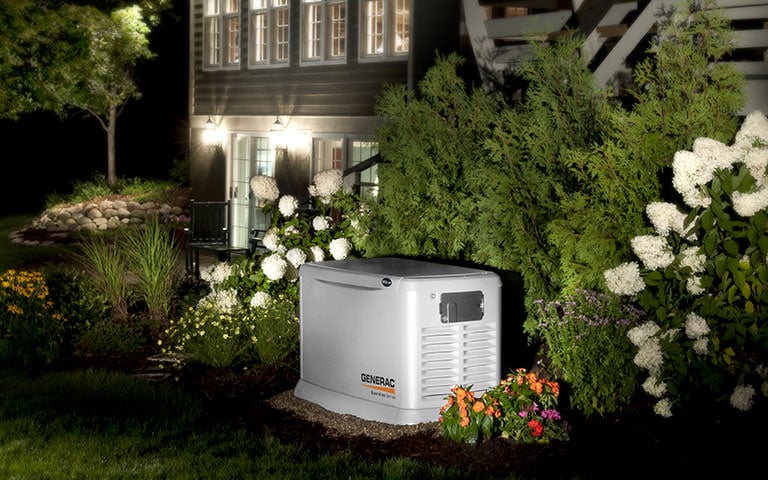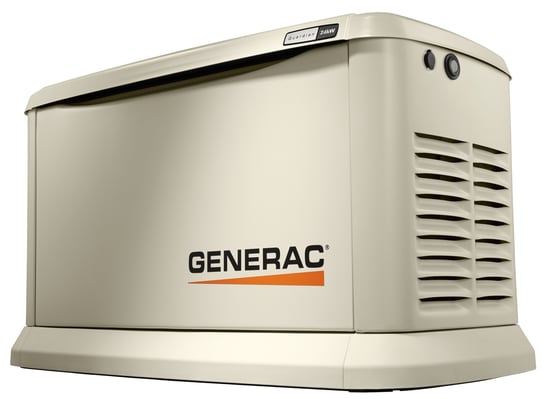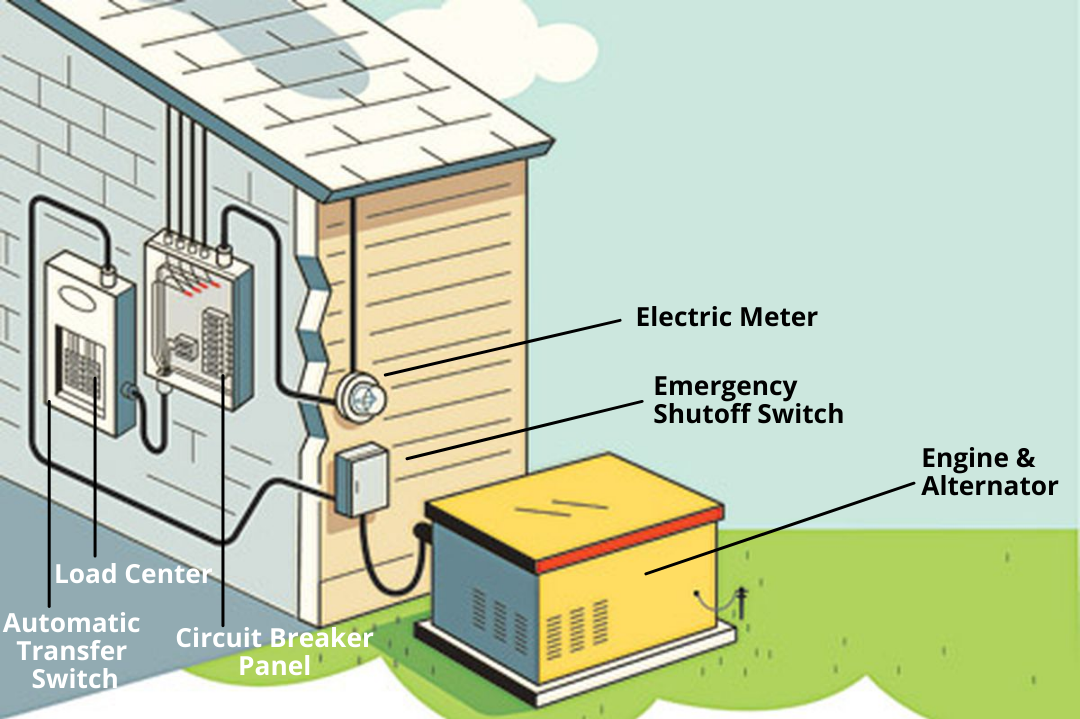Backup (also known as standby) generators are an excellent way to provide your home with reliable, uninterrupted power during a power outage. Founded in 1959, Generac is the number one manufacturer of home backup generators, providing customers with quality comfort and peace of mind during times of need.
So, how does a Generac work? We answer that question and many more below.

Before that, it's important to note: demand for generators has been extremely high as of late due to record-setting weather-related power outages. If you are interested in a generator for your home, it's best to start the process ASAP so that your products can be ordered and installed sooner than later.
1. How Does a Backup Generac Generator Work?
Generators can run on liquid propane (LP) or can use your home's natural gas lines. Like your AC unit, the standby generator sits right outside your home and waits for the signal to kick into gear. Unlike a portable generator, a backup generator starts automatically. So in the event that the power goes out, all you have to do is sit back, relax, and wait for your appliances to power back up!
What are the components?
The engine and the alternator -- that work together to generate the electricity -- sit outside in a weather-shielded, sound-deadening box that's anchored to a concrete pad (also known as a hurricane pad). The fuel source is used to power the engine, which is connected to the generating unit, usually referred to as an alternator. It produces the same alternating current that your regular electric utility provides.
The automatic transfer switch (ATS) is placed inside and connects the generator to the house's main breaker panel. The ATS chooses the home's power source, which means it makes the switch between utility power and generator power. When the regular power is functioning normally, the ATS selects utility power. When there is a power outage or other issue, the ATS is signaled to switch the power source to the backup generator.
At the same time of switching to the generator, the ATS automatically isolates the home from the electric utility lines, preventing danger to utility workers and generator overloads. Once the utility power returns, the ATS will simply switch the generator off and go back to regular power.
Generac also has an "exercise" feature where, at a predetermined day of the week and time, your generator will kick on and do an "exercise". Every week or every other week at the set time, the generator will run for a few minutes to warm up the engine and make sure everything is working as it should., then shut itself down. During this period, there aren't any power interruptions or transfer of the switch.
2. How Long Does It Take For It To Turn On When the Power Goes Out?
So, once all these components work together to signal that the backup power is needed, how long will it take to come on? The power supply is not instantaneous -- the generator will wait a few seconds to make sure it's not just a flicker in power and that it's actually an outage. With that being said, the generator will be running at full power within a minute or two. That's likely less time that it'd take you to find a lighter and light a candle!
 3. How Long Can You Run a Generac?
3. How Long Can You Run a Generac?
If you generator is powered by propane, your generator can run as long as there is enough fuel supply. A 500-gallon tank that powers your whole home, for example, should last about a week if running 24 hours a day. But it really depends on the size of the fuel tank as well as how many appliances the generator is powering.
If you have a generator that uses your home's natural gas, it can run indefinitely as long as the gas is continuously supplied.
4. How Loud Is the Generac Generator?
Permanent generators designed for use in residential areas must not exceed a certain noise level by law, so you won't have to worry about the sound or having no power! When about 20 feet away, the Generac Guardian line produces around 66 decibels, compared to 68dB for most central air conditioners. You can compare these sounds to a vacuum cleaner at 70dB and an electric blender at 88dB.
5. Where Can the Generator Be Installed?
The generator should be installed as close to the electric and gas meters as possible. The generator must be installed at least 18 inches from your home and must be a safe distance from doors, windows, and air intakes so that exhaust gasses can be safely vented. You will also need to get approval from any HOA's and keep local community restrictions in mind.
Next, you should clear the area around the gas meter or liquid propane tank, the service panel, and the location where the concrete pad/generator will be placed.
6. Will It Power My Whole House?
Generac generators are so popular for home backup power because they can be sized to power your whole house or configured to power only what you need. If you only need certain appliances and can live without others, your generator won't waste energy powering them.
Generacs also have a feature called "load shedding" where certain appliances turn off when others are being run. You get to choose the sequence in which items are shut down when the system is drawing too much power. For example, you can set is so that the television shuts off when you need to use the microwave -- or whatever makes the most sense for you and your family.
7. How Much Will My Generac Generator Cost?
Purchase price for a backup Generac varies depending on the product line and the kilowatts. A 7.5kW model can start at around $2,000, while 22kW and 24kW models start around $5,000. 45kW models start at around $14,000 and 80kW jumps to about $25,000.
It's also important to note that some of these prices include the transfer switch and installation cost, while others include only the generator. Since every home is different, every installation will be different. Average installation cost will depend on the placement, the number of materials required, where you live, and if it's LP or natural gas. The best way to get a detailed and accurate quote is to schedule a free in-home assessment with a local contractor.
The cost to run your generator completely depends on the fuel source (liquid propane or natural gas) and the number of appliances you choose to power. 8. Will the Generator Need to Be Professionally Installed and Maintained?
8. Will the Generator Need to Be Professionally Installed and Maintained?
As an option, Generac offers the Guardian Series systems prepackaged and pre-wired with comprehensive installation instructions. You could perform the simpler site preparation steps and have a professional make the electrical panel and fuel connections, or you could complete the entire installation yourself. However, for safety reasons, Generac recommends you use an authorized Generac dealer or licensed contractor.
A professional will know local and national codes and will be able to safely place, ground, and hookup the generator. An experienced contractor will also make sure to cover all small details that, if missed, could lead to a gas leak, explosion, compromised air quality, fire hazards, and costly repairs.
Like your air conditioning and heating systems, your generator should also be tuned-up annually. A generator tune-up from ECI Comfort will include tasks such as changing the oil and oil filter, changing the air filter, cleaning the outside and inside of the generator, and checking/changing the batteries and terminals, to name a few.
9. How Do I Choose the Correct Size?
The right size generator will depend on where you live, the square footage of your home, and if you want to power the entire home or just certain appliances. Using Generac's handy sizing calculator, you can choose the right options and select specific items you'd like to power to see the three best options for your home. You can also download our wattage worksheet by clicking the button below.
While these online tools are very helpful in determining what size generator is best for your needs, you should still have a contractor come out to take a look at your home and go over the best options with you.
10. What's the Difference Between Standby and Portable Generators?
The main difference of a portable generator is in the name: it can be multi-purposed for things like your home, camping, or a tailgate. A standby generator, on the other hand, is permanently installed outside your home. The other big difference is that backup generators automatically turn on and off, while portables use a manual transfer switch, meaning you have to power it on and off yourself.
Portable generators are inexpensive and easy to acquire, but limit the amount of items you can power. Standbys are more expensive and can have a long lead time (especially right now), but provide uninterrupted power for as many appliances as you want.
Yes, you could live without power...but why would you want to?! If you live in the Delaware Valley/Greater Philadelphia area and would like to find affordable, reliable comfort within your home, visit our website or give us a call at 215 - 245 - 3200 to learn more.








